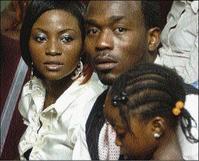Gleaner Writer

Joan Wright (left) with estranged husband, Calvin 'Prodigal' Whilby, and one of his children. - File
Throughout her life, it seems, Joan Wright had been covering up her emotions and experiences. Then she moved from not speaking about her pain to pouring it all out on paper over a weekend in August 2008, sometime after the second and final separation from husband and gospel deejay, Calvin 'Prodigal' Whilby. In her book, From Brokenness to Victory: The Price of My Breakthrough, still in manuscript form, she said of the part of her childhood spent in Spicy Hill, Trelawny:
"My life was seemingly good to neighbours and relatives back in Kingston, who felt that when Aunt Ethel died, I would inherit everything since she had no children, but no one knew how imprisoned and neglected I felt as a child. I learned to mask my pain very early in life because I did not want to let my grandaunt know how I felt, so I pretended I was fine to her and everyone else and soon this became a learned behaviour; new approach to pain and a way of life as an adult. No one from church or school knew that I was lonely, had no self-esteem and struggled with rejection as I was always bubbly and well-mannered. Bubbly, I guess, to gain the approval of everyone, I wanted to feel accepted because I would hear people calling me ugly, they referred to me as the black pickney from Town, dry head likkle gal or Ms Ethel boardhead likkle gal."
raped
The masking continued through being raped at 11 years old ("after this man raped me, he bathed me. I remember the bath was bloody; he redressed me in spare clothes I'm guessing belonged to his niece and made sure I got home safe"). It continued when she returned to Kingston and attended Wolmer's High School for Girls ("I was also funny, so I entertained my classmates a lot and I was an ardent track star, at least on sports days; I was called 'Hurricane' because I ran so fast. I was a part of the student council, a prankster and a pain in every prefect's neck, as I was very feisty, especially to prefects. Despite all this, I had no close school friends or took no one home because I wouldn't want them to see where I lived or how I lived.")
And it was sustained throughout her eight-year marriage to popular gospel deejay, Calvin 'Prodigal' Whilby, a marriage which is on the brink of a formal separation and included her husband fathering a child with another woman during their marriage.
Still, Joan Wright (she has stopped using 'Whilby' and refers to Prodigal as her ex-husband) said that her marriage is a pivotal part of her journey, but not so much the whole focus of From Brokenness to Victory: The Price of My Breakthrough. And it does occupy a relatively small section of the 11 chapters, but with the separation it looms large.
self-righteous
Joan Wright told The Sunday Gleaner: "I remember being called self-righteous several times and if I ever spoke out about anything, I would be seen as not being submissive or being disrespectful. 'Cause what I also learned in the marriage, I also learned to understand and appreciate the mind of a former gang member or gang leader or whatever he referred to himself as. Because the thing is, these people, it is almost as if they do not allow respect to be bestowed upon them. They demand it. If he says the table is pink and I say to me it looks off-white then 'yu a dis me, cause yu suppose to deh pon my side'. It was black or white, no grey area."
a powerful woman
At three and a half years old, Joan Wright found herself in a grey area of sorts, taken by the State from her parents and had been living on Elletson Road in Kingston. She was sent to stay with her father on Gold Street and left the house to look for her mother in dark, pre-dawn hours. The police picked her up and she ended up at Maxfield Park Children's Home - but not for long.
She writes: "On the morning of the hearing while waiting for our case to be mentioned, my mom secretly stole me from the caregiver and whisked me off to the parish of Trelawny to live with a grandaunt I'd never met." That was the beginning of her Spicy Hill experience. Wright laughed when The Sunday Gleaner asked if her mother was ever prosecuted and said, "We live in Jamaica."
In the introduction, Wright asks readers to "never be judgmental". The Sunday Gleaner asked if that included the man who raped then bathed her (she does not name him in the book). "I basically wanted people to take away from my story that I consider myself now, 'cause I didn't see it back then, as a powerful woman and a woman with a whole lot of strength. Because I have had to deal with all of these things and I have had to deal with a terrible, terrible, terrible divorce and not even let my children see me. Whenever I needed to cry, I go into my bedroom and lock the door. I go into the bathroom and that's where I pray out loud, that's where I bawl, wash off my face, I come back out and ask, 'Gabre, what do you want to eat'," she said.
It seems that Wright is trying her best to provide her children with a level of peace which she experienced when she was in Spicy Hill, Trelawny. "I remember somebody asking me, with all that happened to you, was there ever a time you felt loved. I said to them the closest I think I got to that was my grand-aunt," she told The Sunday Gleaner.
When she came back to Kingston to live with her family, there was not that love. Wright said: "When I arrived in Kingston, it was pretty obvious that my existence was a figment of my family's imagination; there was no prepared 'inn' for me. I remember hearing footsteps at nights behind the house which I came to later find out were steps of gunmen taking shortcut, to cross the gully. I felt targeted in my home, the target of verbal insults, something I thought was strange since now I was with family. I was talked down to, humiliated, called ugly, black, thief, I was called 'likkle gal' a lot, and while this was common in the ghetto it felt wrong and rude to me, naturally I felt unwanted."
overwhelmed and rejected
Eventually, she went to Wolmer's and, as the eldest, became a mini-mother of sorts to her younger siblings, which caused her to feel overwhelmed and rejected, as her mother started travelling to the eastern Caribbean to work. Then, in her search for love, she got pregnant while still a teenager. She writes:
"My absentee father visited me one day after hearing the news and gave me the biggest (box) slap in my face that I ever felt in my life, this he did to express his disapproval, and disappointment in my decision to become pregnant and the further decision to keep the child. All my family members who never shared a moment with me as a child or teenager suddenly felt as if their world were coming to an end because I got pregnant. It left me very confused."
The Sunday Gleaner asked if she was being held up to expectations that she did not know about and Wright answered with an emphatic "yes. You have the situation in the inner city all the time where this one child out of the family is supposed to be the redeeming person or the Messiah of the family".
true Christian
Ironically, she might have eventually become that Messiah, after sleeping on the floor at her cousin Veronica's home at times after being put out (plus "a couple of times I went back to my stepdad's house when it was dark and slept in the kitchen outside on newspaper and got up early the following morning before anyone else awoke") and eventually living with her boyfriend's parents, with whom she is still close although the relationship was short-lived.
Wright went on to throw herself into studying and is now doing a law degree. She gave her life back to the Lord after Marcel Thorpe helped her open the floodgates to express her hurt in an empty lecture room at the University of the West Indies and she has long moved into the 'Uptown'. And, of course, there has been the marriage to Calvin 'Prodigal' Whilby.
And she seems to have few regrets.
"Having gone through all I've gone through and realising I really wouldn't have survived if it weren't for the fact that God had a mission for me, I really now understand what it is to be a true Christian," Wright said.

Joan Wright - Contributed
See part two of Joan's story next Sunday when she talks about her marriage to gospel deejay Prodigal.